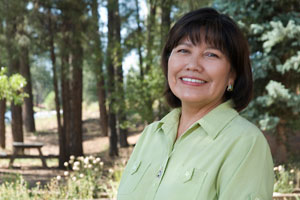Priscilla Sanderson’s admiration shines at the Mayo Clinic while her aspirations come to life on the Hopi Reservation.
Her presence in both places attests not only to her commitment, but also to her wide range of pursuits with a singular focus: defeating cancer.
In the summer of 2010, Sanderson quietly earned an elite recognition by being named one of four Hampton Faculty Fellows appointed by the Mayo Clinic. Named for James Hampton, one of only two oncologists in the nation who are members of an Indian tribe, the fellowship is intended to develop researchers in cancer control and prevention who will work with Native American communities.
It’s work that has already drawn the energetic attention of Sanderson, an assistant professor of health sciences and applied indigenous studies at Northern Arizona University. Three of her undergraduate students having been conducting focus groups on the Hopi Reservation in an effort to discover which channels of communication work best to communicate valuable information about the disease. The work overlaps with her deep involvement in the Partnership for Native American Cancer Prevention.
As a mentor who is being mentored, Sanderson serves as a vital connection between cutting-edge cancer research and the next generation of clinicians. Someday, she hopes, her path will connect Native American communities with cancer prevention and awareness while drawing new, young faculty into the quest.
“I have top-notch mentors,” Sanderson said, including Dr. Judith Salmon Kaur—the other of the two oncologists with Native American ties. Kaur is medical director for Native American Programs at the Mayo Clinic-Rochester, Minn., and is the principal investigator for the Spirit of Eagles Community Networks Program, funded by the National Cancer Institute.
“It’s fun going to the Mayo Clinic because I get to see state-of-the-art treatments and sit in on meetings with the doctors,” Sanderson said. “When I look around, I’m in awe of the well-known medical researchers, people who are conducting clinical trials.”
In the short term, Sanderson hopes to be part of a team that is awarded an $8.5 million grant from the National Institute on Minority Health and Health Disparities for an Exploratory Center of Excellence. The proposal, written through the Interdisciplinary Health Policy Institute at NAU, proposes a Center for American Indian Resilience.
Winning “would help show the National Institutes of Health that I can manage a major grant,” Sanderson said. And she has something specific in mind: an RO1 grant from the National Cancer Institute funded at $500,000 a year for up to 10 years or longer.
“With that grant, you can continue a project for as long as you want,” Sanderson said. “I could recruit minority faculty and mentor them, which I hope would help with the NAU mission.”



